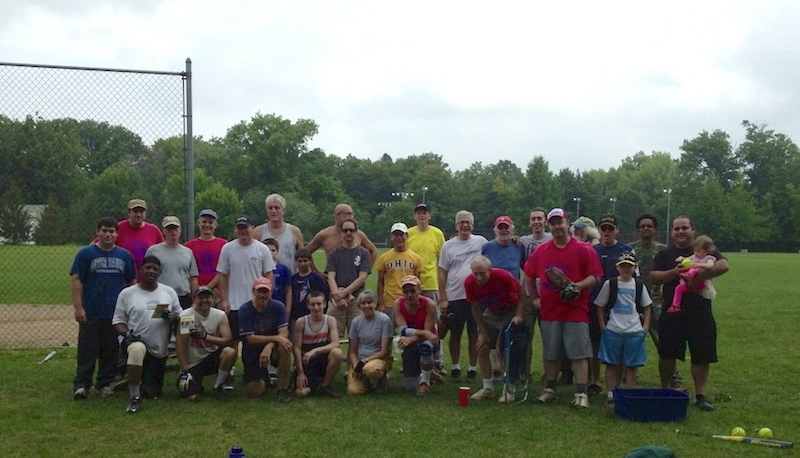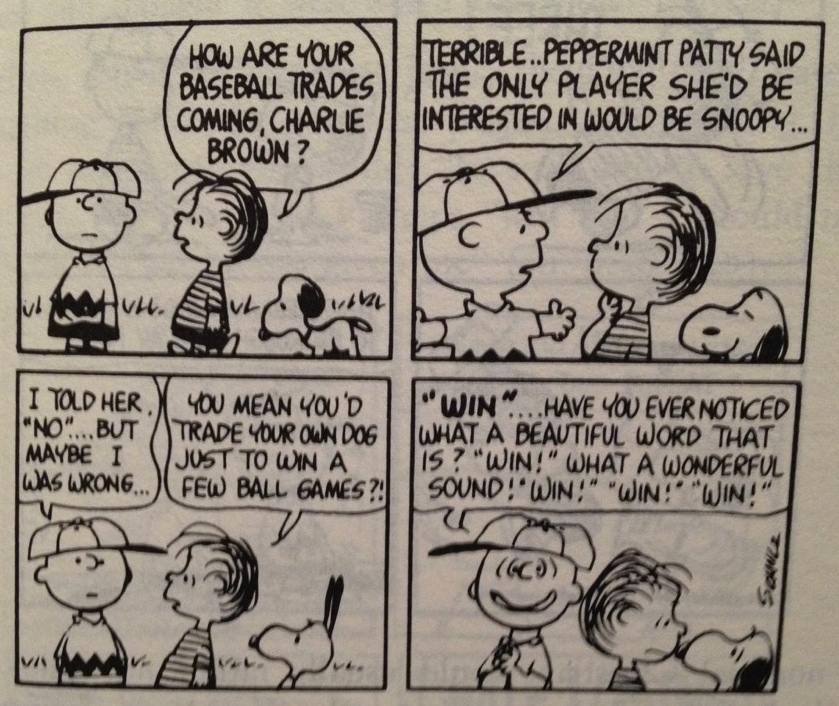
Yesterday’s Free Play Softball game was epic. For starters, 27 players were on hand. Dave Kolb thought this set the record for turnout in September. It was the best turnout this season, and, the icing was the appearance of both new first timers and some returnees from past seasons. We ended up with my ideal outcome, a one run game.
When is it beneficial, or necessary, to make the effort to learn more about what each group member’s reflections are about their own experience of the group?
Describe the kinds of Free Play softball games that you enjoy the most.
phenomenological (and social-psychological/anthropological) reflections…
We’ve been doing an experiment for nine weeks. Mark Jr. and I have been choosing up sides school-yard style. The format we use is less straight-forward than this because our goal is a close game under a particular historical set of results; since Mark jr. began playing with us, his team wins 75% of the games.
The ‘picking’ format aims to give both teams a reasonable chance of competing, by putting Mark Jr., our best player, at a disadvantage by giving me the first pick and giving the team I choose the home field. Two weeks ago, Mark Jr. did something brilliant, if the goal is too retain one’s advantage. He moved himself from the second most crucial position, shortstop, to the most important position, pitcher. The end result was he gained his team a half dozen or so more base runners in each game by walking less batters than the opposing team’s pitchers. Two routs resulted.
What to do? Some would say, ‘why care about this at all?’
I do not know what the collective hopes of the players are for what kinds of games unfold every week. There is one of strain of the game’s longstanding ethos that supposes ‘what will be, will be, and then, next week, it will be something different.’ But there are other perspectives and positions too. Over twelve years I am a close observer of what kinds of results seem to deliver the most utility, evoke the most good feeling for the most of us. Players, overall, enjoy a close game. Speaking for myself, I assume I would rather lose ten one run games than win ten five run games. Yet, other players don’t care about the score, or, much prefer to crush the opposition. For some, score doesn’t carry any weight at all with respect to their enjoyment.
Every participant’s relationship with the act of the game accords with his or her individual integration of their own concerns. In the game’s human system, the focal point of concern is aggregated by the group.
Concern names the aspirational aspect of a game, in my observer’s terms.
But, what to do in our actual game? I have largely set for myself a management role and this leans into leadership of a very oddball, informally instantiated, willful, and sometimes imperious, sort. My role unfolds in the self-organizing context the Kolbs have written about. And, my role is highlighted in most player’s experience by virtue of my own focused intentions and attempts to, at different times, help devise, support and construct, one game (and meta-game,) and not some other game.
It has been suggested to me, “Don’t do so much.” When I take this worthwhile suggestion in, my somewhat practiced response is to think to myself, ‘Control less; manage less. We could do that experiment.’ And, going ‘meta and off in a tangent: ‘Hmmm, I choose to think about this game of games. I wonder who else does this too?’
These are the two poles of my fascination with being a participant/observer in this precisely bounded social system. Additionally, I did eight years ago self-select, by making myself available, to actively help manage–take over management of–the game. This means I am a specific type of participant, one who engages various necessary and supplemental ‘instrumentalities’ for the sake of the game. I will specify ‘sake’ shortly.
When I am in a group for any extended amount of time, I will tend to pull out various ‘devices’ for understanding the group’s life. Groups fascinate me. I could go on and on, but the upshot of my reflection right now is wondering about the extended reflexive relationships players voluntarily invoke as part of their membership in a group.
Put simply, what kinds of thinking about the game do Free Play ballplayers do during the game and, especially, do after the game is over? What are the various concerns of the various players?
Such extended emotional-cognitive reflections are part of the game’s vitality and its lifeworld. I could classify my own reflections. I have a good idea of how reflections could be surveyed. I’m confident individual player’s extended reflexive relationships occupy points on a continuum between there being hardly any reflective footprint and, at the other extreme, the large footprint I would typify in thinking about the game, and about its human system, and about its hidden complexity.
I move, in these comments, between the very local small ‘second-order’ of trying to figure out how to support our games being closer in score to wondering about how much the score counts in any dimension discoverable in the game’s total lifeworld, including after the game is over. On Sunday I suggested to Dave Kolb that I’d have to survey everybody to know what everybody thinks.
In the end of Sunday’s pre-game, after discussions with Dave, and Tom and Mark Jr., I did did not revise our current experiment, and, we ended up with my ideal outcome, a one run game.
Go figure. Nevertheless, my suggestion, in light of thinking about the group matter of Free Play softball, is:
When is it beneficial, or necessary, to make the effort to learn more about what each group member’s reflections are about their own experience of the group?
This is a deceptively profound question. When such an inquiry is implemented, a feedback channel (or loop,) is created too. When you increase knowledge about the group, this increases self-knowledge about the group. When you increase knowledge about other person’s self-knowledge, you increase your own self-knowledge, and, the group’s knowledge about its group ‘self’ is increased.
I’ve observed over the years that the presumption that group identity is unitary and is normative in a unitary sense–which is the same as supposing the description of a group is a simple description–tends to idealize group identity. This idealization may become loosened, or more plastic, or even undone, if every group member gets to weigh in on a substantial question about his or her experience in the group.
Describe the kinds of Free Play softball games that you enjoy the most.
As the group’s ‘meta-manager,’ I’d like to locate the field of possibilities as much as possible at where it is more likely player’s experience will provide the player with satisfaction. What I am trying to mitigate is the tendency for group satisfaction to be negatively impacted by the zero-sum consequence, satisfied winner and grumpy loser, when the field of possibilities is mostly oriented to the score. Close games allow for more satisfaction.
There is no pervasive idealization of ‘freely playing’ that is possible; which is to say the assumption that the game normatively isn’t about the score is incorrect. The key to understanding this is keeping an eye on individual player’s satisfaction during, and at the end of each game.
(One radical experiment that we will not ever do would be: keep track of outs but not of the score.)



